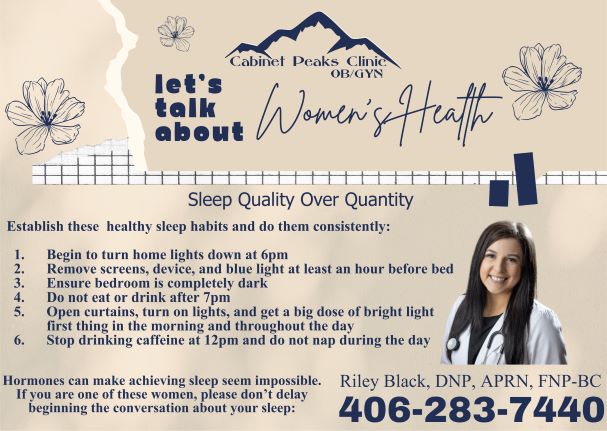
Ad picture of Riley Black. 406-283-7440
Women's Health Wednesday: Achieving Sleep Quality over Quantity
Sleep is considered a physiological need; without it for a sustained period, our cognitive function declines, metabolic process inverts, and cardiac function alters, which if not corrected, leads to death. However, what happens when we get sufficient hours of sleep, but our sleep quality suffers? The golden recipe for good sleep is:
1. When you go to sleep, you can fall asleep within 30 minutes
2. You stay asleep without interruption for 7-8 hours and,
3. You wake feeling rested and energized.
If you are not getting all three of these marks, you are not getting quality sleep. It is an illusion to think getting more hours of sleep is restorative particularly if your sleep is interrupted by unconscious or conscious wakings. Meaning, you may go to sleep at 9pm and wake up at 9am however, if your brain did not cycle through the circadian rhythm pattern essential for sleep, you are considered sleep deficient.
Our circadian rhythm is an unconscious and automatic function within our brain that is tightly influenced by external and internal factors. Internal factors may include hormone or endocrine dysfunctions, low melatonin production, excessive neuropathic stimulation, or cardiovascular excitability. External factors contributing to our natural sleep regulation include our exposure to light, our diet, when we eat, and how much we eat, stimulating substances, and stress.
Internal factors affecting sleep may be difficult to detect and usually require a medical evaluation. However, many external factors are within our power to control and may in fact be greater influences on our quality of sleep than you may realize.
One of the greatest controllable influences on our sleep is light. Our circadian rhythm cycle is complex, but it is largely influenced by the hormone melatonin, that is produced in a small gland within our brain. The production of this hormone is most influenced by the light we absorb through our eyes. The typical pathway is: at around evening time, our light exposure dims i.e daylight goes down and our home environment lights usually go down. This dimming of light signals our brain to make more melatonin in preparation for sleep. In a normal pattern, a few hours after this increase in melatonin secretion, we begin to get sleepy. If we maintain a dark environment during the entirety of our sleep cycle, melatonin production will continue and help us to stay asleep. When the morning light outside begins to change and become brighter, our eyes recognize this, sending signals to turn off our melatonin production. This drop in melatonin in the morning signals our brain to prepare to wake up. Having bright exposure to light first thing in the morning turns our melatonin off to keep us from falling asleep or fatigued during the day. This system is the proper cycle. However, many people have habits that can interfere with this harmony. Consider, if home lights during the evening remain bright, this inappropriately signals your brain that it is still daytime, and your melatonin production does not occur as it should. This will cause a cascade of changes with your circadian rhythm that may lead to sleep disfunction. The same disharmony may also be caused by inefficient morning light. If you do not get a sufficient or long enough dose of bright light in the morning, your melatonin will not turn off and you will have sluggishness even into the afternoon and can lead to daytime napping; further throwing our sleep cycle into chaos.
Luckily, simple changes in your sleep routine, habits, and environment can greatly support your sleep quality. These are recommended guidelines to follow to optimize sleep for adults, children, teens, and older adults:
At Night:
1. Begin to turn home lights down at 6pm
2. Remove screens, device, and blue light at least an hour before bed
3. Ensure bedroom is dark
4. Do not eat or drink after 7pm
5. Establish a routine bedtime for adults between 9 and 10pm; children 7-8pm.
Daytime:
1. Set a wake-up time between 6-8am
2. Open curtains, turn on lights, and get a big dose of bright light first thing in the morning and throughout the day
3. Drink a large glass of water before caffeine
4. Stop drinking caffeine at 12pm
Making simple changes can support your natural cycle and melatonin production. However, these are not the only factors contributing to sleep quality and if these good sleep habits are not consistent, you will not feel the benefits. Diet, activity, stress, and other hormone functions play a large role.
If you are having difficulty sleeping, either falling asleep, staying asleep, snoring or apnea, or excessive daytime fatigue, and has been ongoing for more than 6 months, you should be evaluated by your medical provider.
Sleep is too important for our health to put off and needs to be addressed just as any other health concern.
For women in particular, our unique cocktail of hormones can make achieving sleep seem impossible. If you are one of these women, please don’t delay beginning the conversation about your sleep. Call Cabinet Peaks OB/GYN for a consultation.
For more information, please visit websites for National Sleep Foundation and the American Academy of Sleep Medicine


